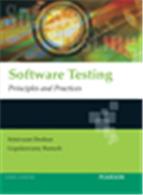Software Testing: Principles and Practices

|
Author(s):
Author:
Srinivasan Desikan
- ISBN:9788177581218
- 10 Digit ISBN:817758121X
-
Price:Rs. 760.00
- Pages:480
- Imprint:Pearson Education
- Binding:Paperback
- Status:Available
-
|
Software Testing: Principles and Practices is a comprehensive treatise on software testing. It provides a pragmatic view of testing, addressing emerging areas like extreme testing and ad hoc testing
Table of Content
- Setting the Context
- Principles of Testing
- Software Development Life Cycle Models
- Types of Testing
- White Box Testing
- Black Box Testing
- Integration Testing
- System and Acceptance Testing
- Performance Testing
- Regression Testing
- Internatinalization (I18n) Testing
- Ad hoc Testing
- Select Topics in Specialized Testing
- Testing of Object-Oriented Systems
- Usability and Accessibility Testing
- People and Organizational Issues in Testing
- Common People Issues
- Organization Structures for Testing Teams
- Test Planning, Management, Execution, and Reporting
- Test Management and Automation
- Software Test Automation
- Test Metrics and Measurements
|
Salient Features
- Focuses on geographically distributed teams. Software Testing addresses people, orgizational structures and models for global teams.
- Showcases India's rich experience in testing. An increase amount of product testing is being done in India. However, not many books examine this experience or the India Business Model. This book showcases the best of these practices.
- Emphasizes pratical experience while retaining comprehensive theoretical rigor. This book addresses pratical aspects of testing like internationalization and regression testing while preserving traditional approaches like equivalence pratitioning and cyclomatic complexity.
|
|
|
|
|